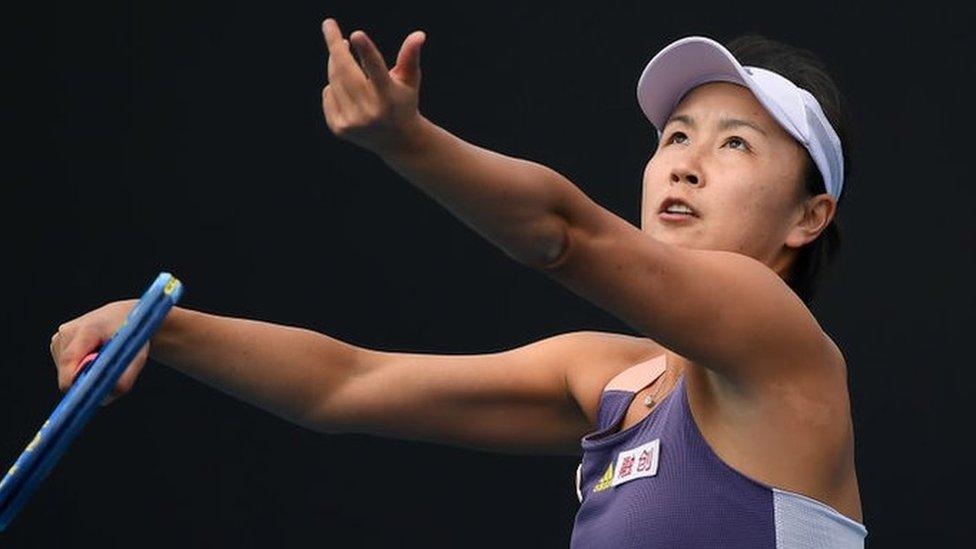Peng Shuai: What we know so far
- Published
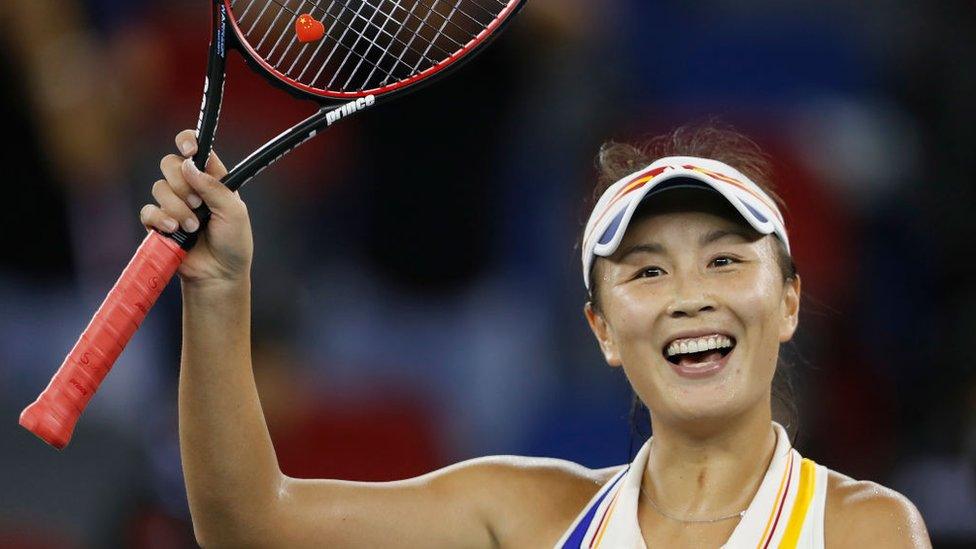
Peng Shuai said she was "forced" to have sexual relations with former Vice-Premier Zhang Gaoli
Earlier this year, Peng Shuai, one of China's top tennis players, accused former Vice-Premier Zhang Gaoli of coercing her into having sex.
Since posting the accusations on social media, there has been widespread concern about her wellbeing and safety.
She has largely stayed out of the spotlight since making the claims in November, but in a rare recent interview she appeared to contradict her earlier statement and denied making any allegations of sexual assault.
With little known about her welfare, the Women's Tennis Association (WTA) says it is still concerned that she is being censored by the state.
Here's what we know.
Who is Peng Shuai?
Ms Peng, 35, is a prominent figure in Chinese tennis with almost $10m in career prize money. Introduced to the sport by her uncle when she was eight, Ms Peng made her Women's Tennis Association (WTA) debut in 2001 and has since gone on to win 25 titles in singles and doubles. She has also competed at three Olympic Games.
In 2014, she became the first Chinese player to reach world number one in doubles. She has won two women's doubles Grand Slams - at Wimbledon in 2013 and the 2014 French Open - both alongside Taiwan's Hsieh Su-wei.
In 2006, Ms Peng and fellow player Li Na started speaking out about China's tennis programme. Under the system, the state kept a portion of their earnings. Ms Peng decided to become an independent player, away from the Chinese state system and has talked about how she has been able to have more autonomy.
"I am the decision maker and all the choices I have to make allow me to improve myself," she told the Olympic channel in an undated interview.
In all of her interviews, her passion for sport shines through.
"I love tennis. I want to be on the court and fight. I just want to be happy on the court," she said during an interview at the Australian Open in 2018, external.
Ms Peng has a strong social media presence, with half a million followers on Weibo, the Chinese equivalent of Twitter.
What was in her accusation?
In a 1,600 word post on Weibo in November, Ms Peng said she had a romantic relationship with former Vice-Premier Zhang Gaoli and that he had "forced" her to have sexual relations with him.
It is the first time such an allegation has been made against one of China's senior political leaders.
"I know that someone of your eminence, Vice-Premier Zhang Gaoli, you'll say that you're not afraid," Ms Peng wrote in her post, "but even if it's just striking a stone with a pebble, or a moth attacking a flame and courting self destruction, I will tell the truth about you".
She said he had first coerced her after she visited his home to play tennis. "That afternoon I didn't give my consent and couldn't stop crying," she wrote. "You brought me to your house and forced me and you to have relations."
Ms Peng has acknowledged that she will not be able to provide proof to back up her claims.
"I have no evidence, and it has been impossible to leave any evidence... You were always afraid that I would bring something like a tape recorder, to record evidence or something... There is no audio record, no video record, only my distorted but very real experience."
Mr Zhang has not commented on the allegations.
Who is Zhang Gaoli?
Mr Zhang, 75, served as vice-premier between 2013 and 2018 and was previously the top party official in Tianjin.
During his time as vice-premier, he presided over preparation meetings for the 2022 Beijing Winter Olympics.
He was also involved in China's Belt and Road project and visited a number of countries as part of this. He also spoke as President Xi Jinping's special envoy at a UN climate conference in 2014.
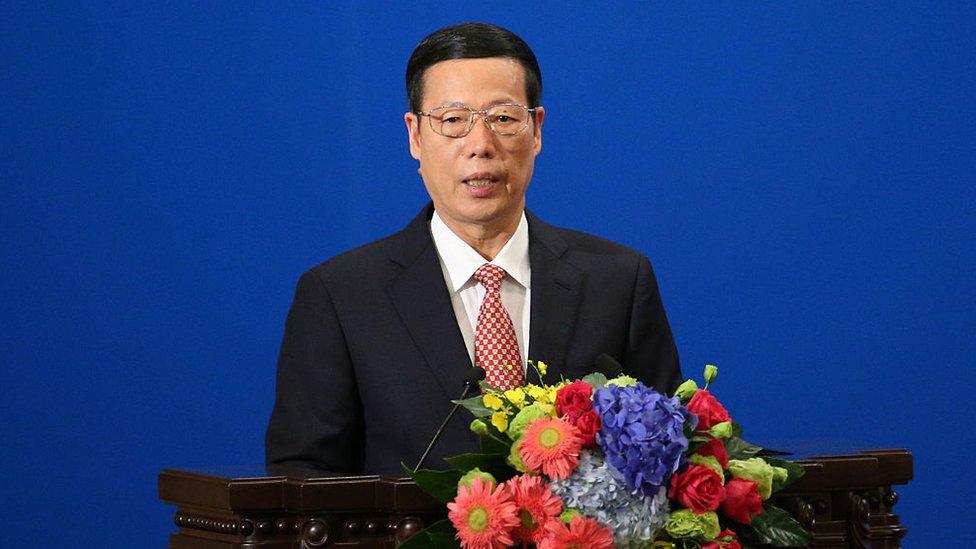
Zhang attended numerous events during his time as vice-premier
Mr Zhang also attended major events such as People's Liberation Army celebrations and was pictured in the front row of the audience alongside Mr Xi.
Duowei News described Mr Zhang has having a "pragmatic style" and claimed he had "rarely been controversial since becoming an official", external.
Since retiring from his role, he has mainly stayed out of the spotlight. His last appearance was in July when he marked the 100th anniversary of the founding of China's Communist Party in Beijing.
Where is Peng Shuai?
After sharing her post on Weibo, the tennis player was not heard or seen publicly for several weeks. That was until 17 November, when state media outlet CGTN published on Twitter what it claimed was an email from Ms Peng.
In the email, which CGTN claimed was sent to WTA chief Steve Simon, she purportedly said that the allegations were "not true".
Allow X content?
This article contains content provided by X. We ask for your permission before anything is loaded, as they may be using cookies and other technologies. You may want to read X’s cookie policy, external and privacy policy, external before accepting. To view this content choose ‘accept and continue’.
Then, several days later, three photos of Ms Peng were posted on a WeChat account under her name with the caption "Happy Weekend". The authenticity of the post has been widely questioned.
State media reporters have published several videos and images of the tennis star attending events including a tennis tournament in Beijing.
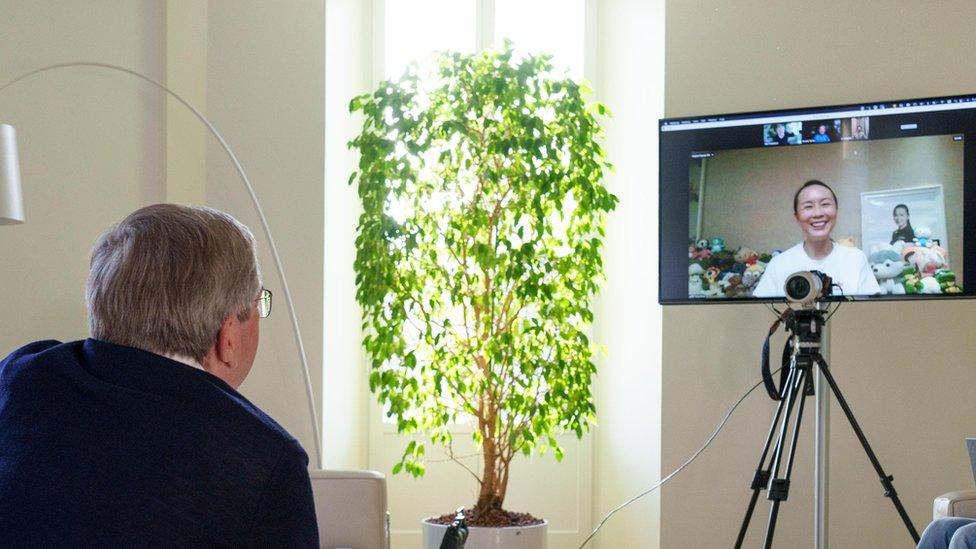
IOC President Thomas Bach spoke to Ms Peng for 30 minutes
The International Olympic Committee (IOC) spoke with Ms Peng in an online video call.
IOC President Thomas Bach said "she explained that she is safe and well, living at her home in Beijing, but would like to have her privacy respected at this time".
On 20 December, she appeared in an interview with Singapore newspaper Lianhe Zaobao, a Chinese-language publication which has expressed pro-Beijing views.
Ms Peng denied making the accusations against Mr Zhang, adding that there had been "a lot of misunderstandings" about the post. She also said that she was not under surveillance.
What has the reaction been?
The UN and US have called for proof of the tennis star's wellbeing.
China's foreign ministry spokesman, Zhao Lijian, said the controversy surrounding Ms Peng had been "maliciously hyped up".
Censors in China were quick to take action against Ms Peng's Weibo post. Comments on her timeline were blocked and remain so. While specific search terms such as her name were temporarily blocked.
A number of major tennis players - including Serena Williams, Naomi Osaka and Novak Djokovic - have spoken out in support of Ms Peng.
The WTA has remained firm throughout the incident, asking to speak to Ms Peng.
On 1 December, WTA head Steve Simon announced the immediate suspension of all tournaments in China. There were set to be 10 WTA events in China next year, including the Wuhan Open and WTA finals in Shenzhen. The Wuhan Open was set to be the first time tennis players had returned to the city since the start of the Covid pandemic.
Mr Simon said that he had "serious doubts" that Ms Peng was "free, safe and not subject to intimidation".
"In good conscience, I don't see how I can ask our athletes to compete there," he said.
WTA chairman: We are worried about Peng's safety
Diana Fu, associate professor of political science at the University of Toronto, says Peng Shuai's accusation is "not only controversial because she points the finger at a tiger: a former top Communist Party ruler, Zhang Gaoli" but because, despite attempts to suppress the #metoo movement in China, "it does not seem to die".
She says: "It is not women's rights that the CCP is against; it is the fear of grassroots mobilisation by a woke young generation who are willing to pay the price, however high, to be heard."
Related topics
- Published22 November 2021
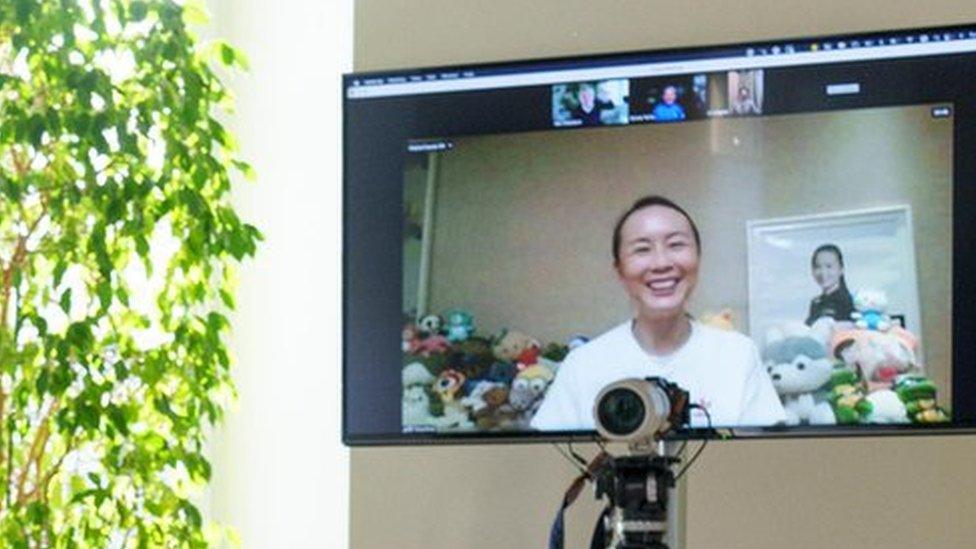
- Published8 February 2022
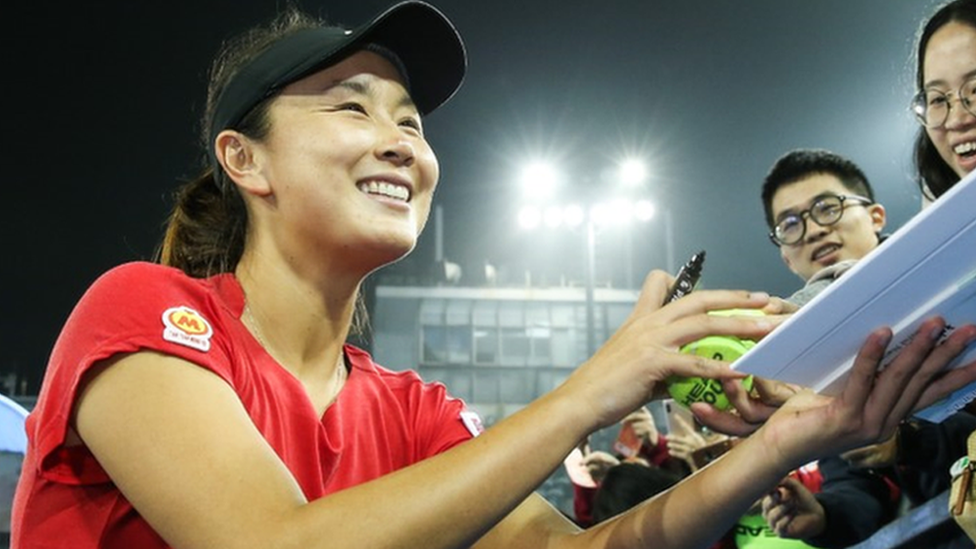
- Published17 November 2021
